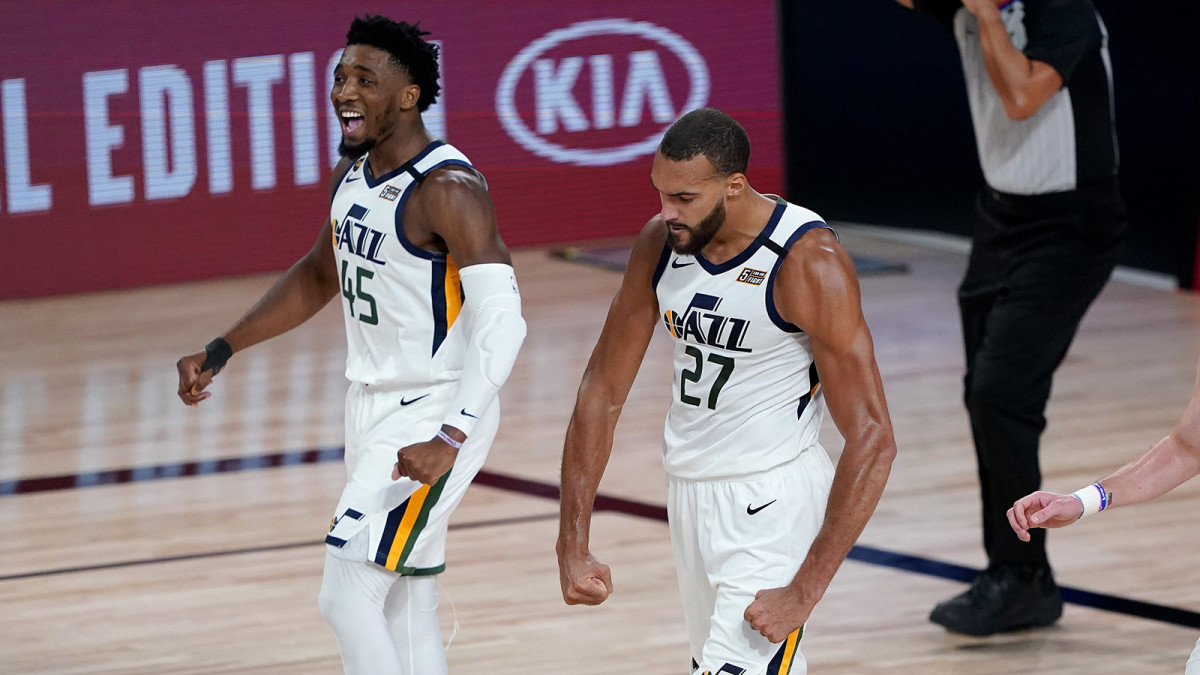What's Next for the Jazz After Losing Game 7 to the Nuggets?
Every weekday, SI’s Chris Mannix will check-in with his Bubble Bits, a quick hit on something notable from inside the NBA’s campus
LAKE BUENA VISTA, Fla.—One by one, Jazz players trickled into the interview rooms on Tuesday night, a devastated look on their faces. A Game 7 loss to Denver came down to a wild sequence in the closing seconds that began with a Donovan Mitchell turnover and continued with a bizarre Nuggets fast break before finishing with a Mike Conley three-pointer that rimmed out. Just like that, Utah was going home.
“To be honest, I [was] in shock," Mitchell said. "That was it. You work so hard to get to a point that we got to, and we were this close. We were down, we came back, and fought and clawed. … This will be on my mind for a long time.”
Losing is never easy, and the sting is undoubtedly sharper when you allow a 3–1 series lead to get away from you, as Utah did. Still: The Jazz played well in the bubble and go into the offseason with a lot to build on.
An obvious positive: The relationship between Mitchell and Rudy Gobert has been rebuilt. Team sources have described the vibe between the two stars as “great” these last two months. Both seemed to have moved past the drama that unfolded last March, when Mitchell and Gobert tested positive for COVID-19, with Gobert admitting to recklessness when it came to the coronavirus. The two have never been best friends, but by all accounts, Utah’s two cornerstones are in a good place.
That’s significant. Mitchell, 23, was a monster against Denver, averaging 36.3 points per game. “This is me scratching the surface,” Mitchell said. Against Nikola Jokic, Gobert, 28, averaged 17 points and 11.4 rebounds. He had 19 points and 18 boards in Game 7, at times playing like a man possessed in the second half. “We want more,” Gobert said. “We started something. We just have to finish it.”

Seeing the Mitchell-Gobert relationship solidified is great news for the Jazz, which could make a significant financial investment in both this offseason. Mitchell is extension eligible, and that’s an easy one: Mitchell is a max contract player, and he will get a five-year, $155 million to $160 million contract. There are some salary cap gymnastics the Jazz can do that may delay Mitchell getting the deal until next summer, but he isn’t going anywhere.
Gobert is more complicated. He’s entering his prime, continues to improve offensively and is arguably the most intimidating defensive player in the game. What’s that worth? It won’t be the $200 million-plus super max extension, that’s for sure. Can Gobert and the Jazz agree on a four- or five-year extension that satisfies both sides? Gobert could decide to roll the dice and hit free agency in 2021, when after the dust settles on the pursuit of Giannis Antetokounmpo there could be money to spend. But it’s a risk, especially when a $30 million per year extension will likely be on the table.
Beyond that … that Jazz don’t have many major decisions. Bojan Bogdanovic will return, and Utah sorely missed his 20-points per game. Conley is likely to opt into the final year of his contract, which will pay him $34.5 million. The Jazz would like to keep Jordan Clarkson, an unrestricted free agent who proved to be a valuable contributor off the bench. The opportunity to upgrade comes in the form of salary exceptions ($9.3 million and $3.6 million) and the No. 23 pick in the upcoming draft.
Are the Jazz championship level? Not yet, but internal development alone could get them there. And after the team seemed on the verge of collapse last March, that’s not a bad way to end a season.
